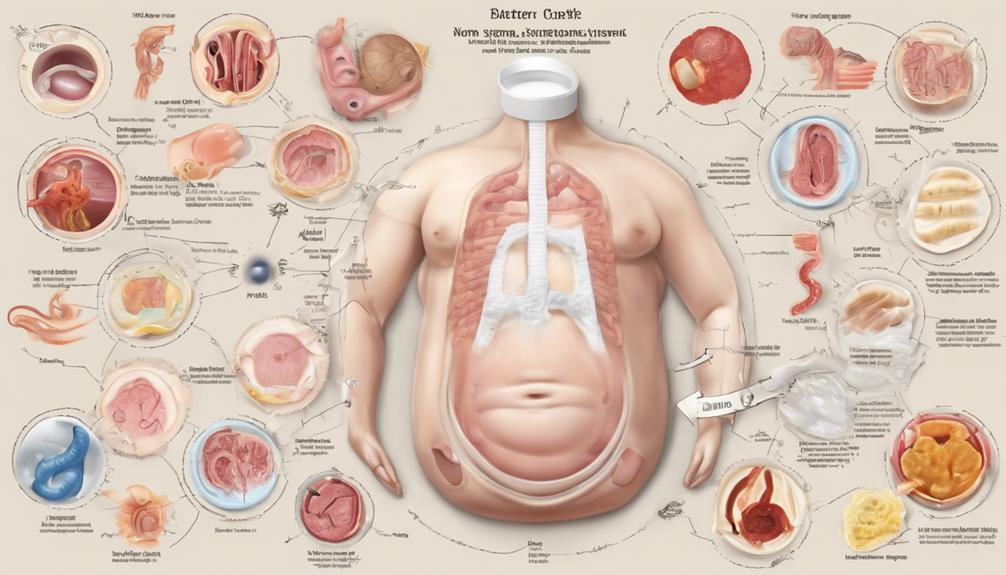As we commence on unraveling the mystery behind why newborns often experience liquid poop, it's akin to peeling back the layers of an onion, revealing the intricate factors at play.
The causes of this phenomenon are multifaceted, ranging from the baby's developing digestive system to the composition of breast milk and various medical conditions.
But what truly lies beneath the surface of this common occurrence? Let's explore the complexities that contribute to newborn liquid poop and gain a deeper understanding of how to navigate this aspect of infant care.
Key Takeaways
- Immature digestive systems in newborns lead to liquid poop for efficient nutrient absorption.
- Breast milk's high water content and components influence stool consistency.
- Formula composition and hydration levels affect newborn stool texture.
- Medical factors like infections or conditions can also cause watery stools in newborns.
Immature Digestive System
The immature digestive system of newborns is a primary factor contributing to the liquid consistency of their poop. At this early stage of life, a baby's digestive system is still developing and adjusting to the digestion of breast milk or formula. This adjustment period often results in the production of liquid stools. The high water content in these stools is a reflection of the body efficiently absorbing nutrients from the feeding, leaving behind mainly liquid waste.
Newborns, whether breast milk-fed or formula-fed, may pass liquid poop multiple times a day. This frequent passage of stool is facilitated by the liquid consistency, aiding in easier bowel movements through their small intestines. The immature digestive system of newborns is adept at processing the nutrients received, showcasing the efficiency of their developing gastrointestinal system.
As newborns continue to grow and their digestive system matures, the liquid nature of their poop gradually evolves to more formed stools. This change signifies the natural evolution of their gastrointestinal functionality.
Breast Milk Composition
Pivoting from the discussion on the immature digestive system of newborns, we observe that breast milk composition greatly influences the consistency of a newborn's stool. Breastfed infants experience liquid stools due to various components in breast milk:
- Lactose: High levels of lactose in breast milk, a natural sugar, contribute to the watery consistency of newborn stools.
- Antibodies, Enzymes, and Bacteria: Breast milk contains these elements that impact stool consistency by promoting healthy digestion.
- Colostrum: The initial milk produced by mothers acts as a natural laxative, aiding in the passage of meconium and influencing the liquidity of stools.
- Fat Content: The varying fat content in breast milk affects the softness and liquidity of a newborn's stool, contributing to the runny nature of their bowel movements.
Formula Feeding Factors
In considering the factors influencing newborn stool consistency in formula feeding, differences in digestion between breast milk and formula play an important role. Formula-fed babies may exhibit softer or more liquid stools compared to breastfed babies due to the composition of formula. Some formulas, particularly those containing partially hydrolyzed proteins, can affect stool consistency in newborns.
Introducing a new formula or making changes to the current one could lead to temporary alterations in stool consistency. It's vital to consult a healthcare provider if there are any concerns regarding the frequency or texture of a newborn's liquid stools while formula feeding.
Monitoring stool consistency is an essential part of ensuring the newborn's digestive health and overall well-being. By seeking guidance from a healthcare provider, parents can address any issues related to stool consistency in formula-fed infants promptly and effectively.
Hydration Levels

Moving from the impact of formula feeding on newborn stool consistency, the hydration levels of infants play a significant role in determining the consistency of their stools. Adequate hydration is vital for maintaining the right balance of fluids in a baby's body, which directly affects the texture of their stool.
Here are key points to bear in mind regarding hydration levels in newborns:
- Breastfed babies: Breast milk has a high water content, leading to more liquid poop in breastfed infants. This is a normal occurrence and helps keep the baby well-hydrated.
- Formula-fed babies: Formula-fed infants may have slightly thicker poop compared to breastfed babies due to differences in the composition of formula milk.
- Monitoring hydration: Keeping track of wet diapers and the frequency of liquid poop can provide insights into the baby's hydration status and overall well-being.
- Preventing dehydration: Liquid poop acts as a natural mechanism to prevent constipation and maintain hydration levels in newborns.
Understanding these factors can aid in ensuring that newborns remain adequately hydrated and healthy.
Underlying Medical Conditions
Underlying medical conditions can greatly contribute to the presence of liquid poop in newborns. Conditions such as lactose intolerance or food allergies can lead to watery stools in infants. Additionally, certain medications taken by the mother during breastfeeding may also play a role in causing liquid poop in the baby. Digestive issues like malabsorption syndromes or gastrointestinal disorders can result in newborns having frequent liquid stools.
Newborns have sensitive digestive systems, and excessive fruit juice intake or the quick introduction of new foods can trigger liquid poop. Infections like Rotavirus are common in infants and can lead to watery stools as well. It's essential for caregivers to be aware of these underlying medical conditions as they can significantly impact a newborn's digestive health.
If parents suspect any of these conditions, consulting a healthcare provider for proper diagnosis and management is important in ensuring the well-being of the newborn.
Frequently Asked Questions
Is It Normal for Newborns to Have Watery Poop?
It is normal for newborns to have watery poop. Their immature digestive systems and breast milk or formula composition contribute to this. Liquid poop is considered normal if the baby is healthy and gaining weight.
Is Newborn Poop Supposed to Be Liquid?
Yes, newborn poop is meant to be liquid as it aids in waste excretion and digestion. The high water content from breast milk contributes to this consistency. It's normal for breastfed babies to have liquid poop due to their developing digestive systems.
Can Breast Milk Cause Diarrhea in Babies?
Breast milk rarely causes diarrhea in babies. It's highly digestible and supports a healthy gut. If a baby has diarrhea, it's likely from an illness, not the milk. Breast milk provides essential nutrients that help prevent digestive issues.
Can Overfeeding Cause Diarrhea in Babies?
Overfeeding in babies can lead to diarrhea. It overwhelms the digestive system, causing watery stools. Adjusting feeding practices helps manage this. If diarrhea persists, consult a healthcare provider. Proper feeding amounts and intervals are essential for preventing this issue.
Conclusion
To sum up, newborn liquid poop is commonly caused by factors such as an immature digestive system, breast milk composition, formula feeding, hydration levels, and underlying medical conditions. Monitoring hydration levels and following healthcare provider's guidance are pivotal in managing this issue.
Remember, understanding the causes of newborn liquid poop can help parents and caregivers provide the best care for their little ones. Stay informed, stay proactive, and stay vigilant for any signs of dehydration.









